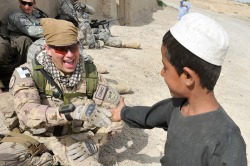Nursing student mines his own battlefields to achieve success

A reprise of a special interview with nursing student Matthew Westcott, who fought in Afghanistan and was later diagnosed with PTSD.
Matthew Westcott found out he'd been accepted into nursing while riding a pedal bike through First and Second World War battlefields in France last June, 2014.
The 25-year-old Afghanistan veteran, on the path to recovery after being diagnosed with Post Traumatic Stress Disorder (PTSD) in 2012, was nearly finished his 800 km bicycle challenge with Wounded Warriors Canada when his mother called with this message:
In September he'd be starting the fast –track option of the bachelor of nursing program at Memorial University School of Nursing.
Mr. Westcott's mother, a nurse herself, couldn't have been happier passing on the good news.
"It was the pinnacle of what I was striving for," said the 6'1" nursing student, fit, athletic-looking and well-known around the School of Nursing for his laughing eyes, brilliant smile and gentle, friendly disposition.
"After everything I'd been through, it was a huge success."
Just three years earlier Mr. Westcott had been a world away, a Canadian soldier hunkered down in Afghanistan where he was constantly under threat.
He was just 21, a reservist, and a second-year biology major here at Memorial, when he decided to go to Afghanistan. Military and nursing careers run in the family; he had wanted to serve since junior high school.
The young solider was posted to a small, isolated area "outside the wire" (and the protection of a large military base) with a company of American infantry.
"It was a combat-oriented environment, and there were a lot of situations, a lot of dealing with Taliban forces," he said. "I was shot at quite frequently, and we lost a couple of guys, so it was a rough and challenging time in my life."
Because of his specialty as a Civil and Military Cooperation (CIMIC) operator, he was one of only 25 operators in the entire country deployed to Afghanistan during that rotation.
Personable, and great with people, Mr. Westcott was selected for the position. His role was to build rapport and provide a link between the indigenous population and the assistance forces.
But it was a position that isolated him from other Canadian soldiers at a time when he needed companionship to help process the experiences.
"I witnessed first-hand the death of colleagues, and a lot of atrocities to children because of the reality of war, (direct and indirect)... children out in the field playing around where there were unexploded (mines) and I had to deal with seeing a lot of images of children who were hurt."
While bearing witness was traumatizing and frustrating, it rekindled his drive to become a nurse.
But the former solider returned home over five tension-filled months later with a lot of extra baggage, and his own personal battlefields to mine before even contemplating making application to nursing school.
"Where I was up tempo for so long my anxiety levels were just out of this world," he said. "It was a huge struggle dealing with my feelings of being comprised and unsafe. The transition home was rough, it seemed almost impossible.
"I couldn't focus or concentrate. That mental and emotional struggle for me was probably one of the hardest things," he said. "No one understood me. I was a very angry, anxious tightly-wound up person that drove a lot of people away."
Shortly after his return, Mr. Westcott was diagnosed with Post Traumatic Stress Disorder (PTSD) and mild depression.
But the diagnosis didn't make things easier. For a long time he denied there was a problem, kept turning on and off his emotions like they were some kind of switch. He was on a downward spiral until finally he called a helpline three years ago.
"Knowing I wanted to be in a caring profession, I began to realize I had to sort things out."
It was the beginning of a long climb back. With the help of a social worker and psychiatrist, and the encouragement and support of his family, Mr. Westcott began making progress with some counselling and drug therapy.
When his progress stalled, he knew he needed to go deeper to get better.
Working with a new psychiatrist who helped him face his past through 'desensitization process response,' Mr. Westcott learned to work through traumatic events and images.
"I was with her for about a year," he said. "I began to see results after a couple of months. I was so ready to fix myself."
Discharged from therapy for almost a year, he couldn't be happier or more grateful for his recovery. He's living his dream, and he's getting married this summer.
He's feeling more like his old self than ever, and sees that his experiences in Afghanistan have helped shape the kind of nursing practice he aspires to.
"I've grown stronger from witnessed those traumatic events in Afghanistan and I know I can do it."